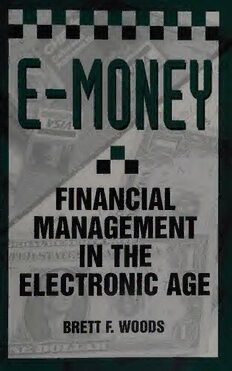
E-Money: Financial Management In The Electronic Age PDF
Preview E-Money: Financial Management In The Electronic Age
E-MONEY FINANCIAL MANAGEMENT - IN THE f LECTRONIC AGE BREn F. WOODS E-Money: Financial Management in the Electronic Age by Brett F. Woods Copyright © 1997 by Brett F. Woods ISBN 0-87364-947-8 Printed in the United States of America Published by Paladin Press, a division of Paladin Enterprises, Inc., P.O. Box 1307, Boulder, Colorado 80306, USA. (303) 443-7250 Direct inquiries and/or orders to the above address. PALADIN, PALADIN PRESS, and the “horse head” design are trademarks belonging to Paladin Enterprises and registered in United States Patent and Trademark Office. All rights reserved. Except for use in a review, no portion of this book may be reproduced in any form without the express written permission of the publisher. Neither the author nor the publisher assumes any responsibility for the use or misuse of information contained in this book. Table of V Contents Introduction: The Electronic Venue 1 Chapter 1: The Dimensions of Change 5 Chapter 2: Government Regulatory Issues 23 Chapter 3: Rules of E-Money Commerce 39 Chapter 4: Money Laundering in the Electronic Age 4 7 Chapter 5: E-Money Business Standards 53 Chapter 6: Risk Management Issues 61 Summary: Observations on the E-Money Phenomenon 69 v Author’s Note The information presented in this book is drawn from open source material, viewpoints, and other documents provided by the Office of the Comptroller of the Currency, the U.S. Department of the Treasury, and the U.S. Treasury Financial Crimes Enforcement Network. Any conclusions drawn herein are solely the responsibility of the author and should not be interpreted as official policy statements of the U.S. government. Brett F. Woods Santa Fe, New Mexico vi Introduction v The Electronic Venue Today, electronic money and electronic payments systems for retail transactions are on the top-ten list of issues for those with significant interests in financial services. Technological breakthroughs promise consumers and retail businesses a wide range of financial services and products in an electronic or dig¬ ital format. The decline in cost and increases in capacity of computers, as well as advances in communications technology, have altered not only the way information is communicated, but also the cost of processing and storing information. These changes, in turn, have led to the emergence of two new forms of retail pay¬ ment systems: electronic cash and banking from home by per¬ sonal computer (PC). Among the many challenges these emerging developments create is that of determining the appropriate role for government in the new digital world of financial services. 1 E-MONEY: Financial Management in the Electronic Age Many argue that the private sector should resolve most pol¬ icy issues and that government should act only when there is clear evidence of market failure. There are others who want the government to play an active role, going so far as being the exclusive issuer of electronic cash. Still others recommend some intermediate approach. A review of the role ©f government in the traditional world of money and finance could be helpful in understanding the competing interests in this debate. In the traditional world of finance, industry has been the source of product innovation and has solved many problems on its own. The public has looked to government to set and enforce basic rules that provide a foun¬ dation for, among other things, consumer rights and responsi¬ bilities (in such areas as protection against loss and invasion of privacy), law enforcement tools and techniques to combat financial crimes, the issuance of legal tender, and the manage¬ ment of the money supply and the payments system. With respect to electronic cash and banking, the need for and application of many of those laws is less clear, and the result¬ ing ambiguity creates issues for the private and public sectors. Determining where to begin and what clarifications to make is a complex undertaking. Understanding the pace of change may help put this issue into perspective. If it takes time before con¬ sumers make widespread use of these products, there will be a lot of room for markets to engage in experimentation and for providers to solve consumer and governmental concerns. Although relatively common in several European countries, electronic cash in the United States is still in an early stage of development. Relatively few people use electronic cash or do business on the Internet. Estimates of future growth are cloud¬ ed by competing forces. The potential benefits of electronic cash will likely stimulate its wider use. These benefits include lower costs, reductions in check and credit card fraud, reduced risk of theft and vandalism in retail outlets, and increased convenience for consumers. As old forms of money crimes decline, however, new ones are 2
